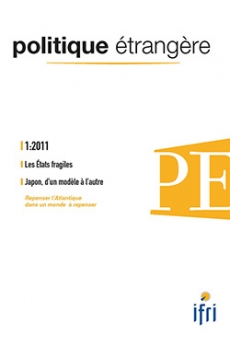
Politique étrangère n° 1/2011
Pour acheter ce numéro, contactez-nous
Recevez les numéros de l'année en cours et accédez à l'intégralité des articles en ligne.
L’après-guerre a incité Tokyo à développer un soft power assurant sa présence internationale : aide au développement, participation limitée aux opérations de maintien de la paix… Ce soft power montre aujourd’hui ses limites. Le Japon hésite à s’ouvrir à une véritable politique d’immigration, à la négociation d’accords régionaux de libre-échange, tandis que les recompositions régionales valorisent le recours au hard power : alliance américaine et renforcement des moyens militaires.
The aftermath of the Second World War led Japan to develop a soft power approach that would ensure its international presence: development aid, limited participation in peace-keeping operations, etc. Yet this soft power seems to have reached its limits. Japan is now hesitating before a policy of greater openness – creating a true immigration policy, ambitious free trade agreements – while simultaneously being confronted by the hard power realities of its regional space – its alliance with the United States and a growing militarization of East Asia.